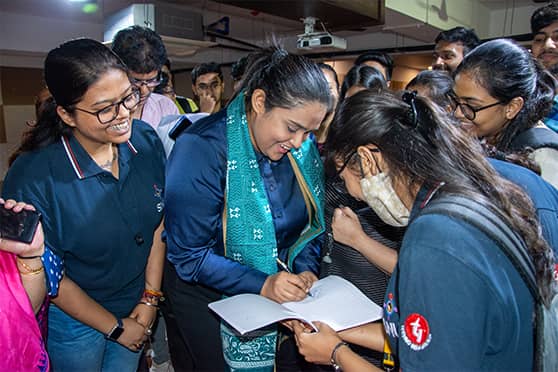Pilot who rescued 800 students from Ukraine tells her story at Sister Nivedita University


Pilot Mahasweta Chakraborty shared her experience of flying Airbus A320 for endless hours to evacuate over 800 students from Ukraine with students of Sister Nivedita University recently.
Chakraborty had also flown oxygen concentrators from other nations during the Vande Bharat mission at the peak of the pandemic amid constant fear of carrying the infection home to her parents.
Excerpts from what Chakraborty had to say:
The duty of a pilot
It was not a choice, rather a duty. As pilots, we are taught to carry out our duty. Moments like these certainly bring out emotions like uncertainty and fear. It doesn’t matter that I am just a 24-year-old girl, what matters are the stripes on my shoulder and my duty. If you say I’m not going to go, then who is going to bring them back? Ultimately, being afraid is an option and it boils down to fulfilling your duty. When you are entering a war zone, you need certain clearances and training, which Indian Air Force pilots are taught. Due to our socio-political conditions and treaties that were signed, there was a special provision made so that we could go and rescue the students. We were told to think of it as any other flight because if we start worrying, the students – who have witnessed far worse things – will be even more anxious.
The real heroes
To me, the students were the real heroes there. They endured inhuman conditions. They were in a war zone at minus 7 degrees Celsius and walked for miles without food. Bullets were being fired and some of them even witnessed people being killed. So even when they were on the plane, they had to deal with the trauma. We saw faces and tried to console them.
The first evacuation flight was from Kosice in Slovakia. Of course, there were other countries. We waited in Istanbul for other clearances to come, which took about three hours. We flew back and forth and before every flight we waited till the last bus of students arrived.
The last flight was through one of the border areas to Istanbul and then to New Delhi. Most of our flights landed in Delhi because many ministries were involved in the clearance process. Our nation was able to set a global example, and at that moment I felt the power of our national flag. And I think that is a huge achievement for every citizen who has drawn the national flag at least once in their life.
Family’s reaction
No matter how old you get, a mother’s heart won’t change. When I got the call, I told her about it. She was concerned in the beginning. During the mission, it was not feasible for me to talk to them. There were network issues and there was a time gap. When I reached home, it was 9.30am. My father was overjoyed. By that time, my father had told all the neighbours and relatives about my involvement in the mission. It was as if I had won the war and returned. My mother was equally proud. She cooked all my favourite dishes that day.
Women’s empowerment
I feel we are still getting used to the concept of women’s empowerment. Earlier, women in aviation were known to be “stepping into a man’s shoes”. Thankfully, it is no one’s shoes anymore. We are all equal. The problem starts when we start generalising male chauvinism and feminism. No group should treat itself as superior to others and we should not fragment society further with gender bias. It is always good to go back to Tagore’s poem Where the mind is without fear to look for a solution and represent ourselves as human beings first.
Pandemic
When there was an oxygen shortage, we brought oxygen concentrators from other countries, including our neighbour China, to Bangalore and Delhi. We also carried basic health supplies to Northeast India, places well beyond Dibrugarh, where there is no provision for transportation apart from air travel. We flew approximately 800 hours during the lockdown.
When people had to stay home, we were asked to step out. The disease was still a mystery back then and people were dying of it. I was afraid of bringing it back home. So, a lot of caution was exercised.